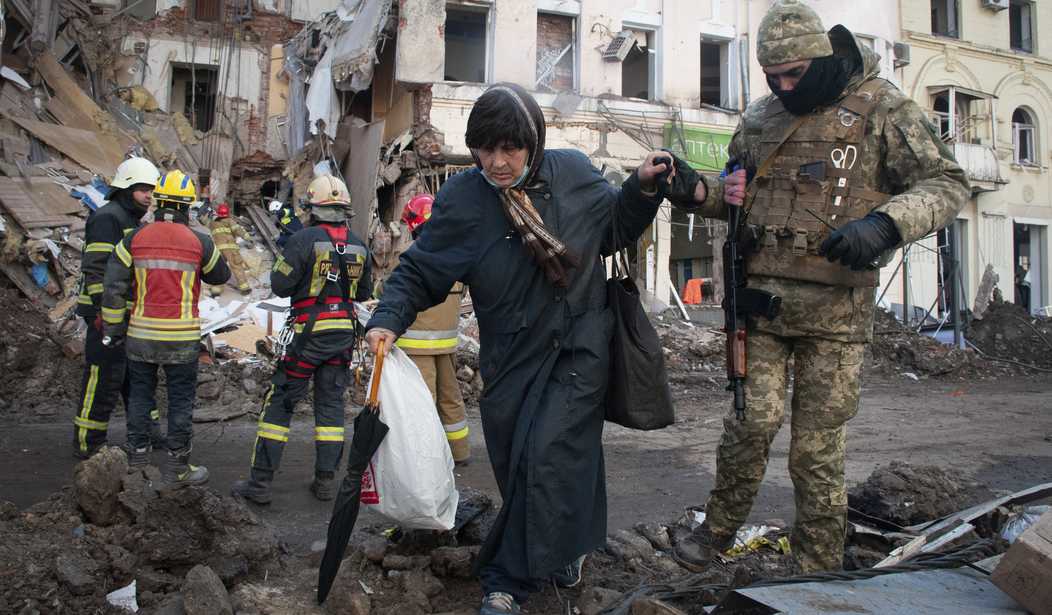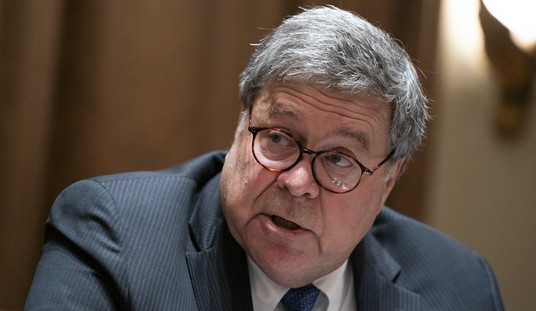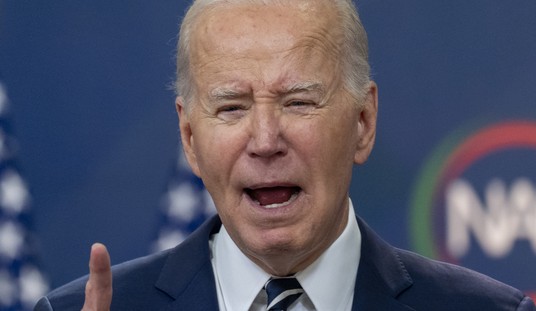Peter Arnett’s celebrated quote — “It became necessary to destroy the town to save it” — was a fabrication during the Vietnam War but has a macabre application to Ukraine. American fecklessness and Russian rapacity together will leave a grease spot where Ukraine used to be. It was all tragically, idiotically unnecessary.
I argued in 2008 and on many subsequent occasions, including the February 2014 note in PJ Media reposted below. The obvious course of action in Ukraine was to permit its people to vote for a divorce, as the Czechs and Slovaks did. Instead we elected to keep the NATO option open for Ukraine, knowing that this was a red line for Russia. Never mind that Putin is a wicked fellow; he is a predictably wicked fellow with a well-defined understanding of Russian national interest, and his response to Ukraine’s prospective NATO membership was entirely predictable.
After three months of nearly-unanimous media predictions of the collapse of Russia, it now appears that the Russian army is close to controlling the Donbas. Extricating it will be difficult if not impossible. The result, as Henry Kissinger suggested at Davos last week, will be (eventually) a peace in which Ukraine cedes territory to Russia. All the “don’t appease Putin-Hitler” rhetoric will simply make us feel shabbier when we make the deal. We should feel shabby. We screwed this up on the grand scale.
Our bathetic outpouring of sympathy for Ukraine served mainly to obscure the ugly fact that Russia has better strategic weapons than we do (hypervelocity missiles and the S-400/500 air defense systems). No doubt the Russian army is corrupt, as Western commentators aver, but not so corrupt by orders of magnitude as our Pentagon, which pays top dollar for obsolete weapons while Russia and China innovate. The Javelin and Switchblade and Stinger are fine toys, but the West remains in fear of Russian nuclear weapons–as well we should. The Biden Administration won’t sent long-range missiles to Ukraine because it fears, correctly, that Ukraine might use them to attack targets deep inside Russia and start a broader war.
Below is what I posed in February 2014, with citations from a “Spengler” essay in Asia Times in 2008. We could have partitioned a peaceful and intact Ukraine. Now we get to divide up the smoking ruins. Shame on us.
Ukraine Should Vote on Partition
Western governments are jubilant over the fall of Ukrainian President Viktor Yanukovich, a Russian ally. They may be underestimating Vladimir Putin: Russia has the option to hasten Ukraine’s slide into chaos and wait until the hapless European Union acquiesces to – if not begs for – Russian intervention.
Judging from Russian press coverage, Moscow already has washed its hands of the feckless Yanukovich. Russia Today whimsically observed on February 22 that Yanukovich lacked the sangfroid of Mikhail Saakashvili, the former president of Georgia and an ally of the West:
Yanukovich could also have dispersed the protesters and maintained public order in the country, whatever criticism it might have brought. This is how the then Georgian president, Mikhail Saakashvili, acted in 2007. He brutally suppressed a peaceful protest and called an early presidential election, which he won, instead of an early parliamentary election, which the opposition demanded and which his party could well have lost. Unlike the Georgian leader, Yanukovich hesitated even when the Ukrainian protest turned Kiev into a battlefield. [1]
Moscow has no need of allies with weak stomachs. But it will withdraw the offer of $15 billion worth of Ukrainian debt purchases and subsidies for natural gas exports to Ukraine and leave the nearly bankrupt country to the ministrations of the West. Careful what you wish for, Russia is telling the West.
Siluanov is being mischievous. Twice in the past six years, the IMF suspended promised loans to Ukraine after the country refused to cut salaries and pensions and raise energy prices. Russia had offered a loan without conditions; any money the West offers will require austerity measures that no Ukrainian government is capable of enforcing.
I’ve argued for years that partition is the best solution for Ukraine, which never was a country but an amalgam of provinces left over from failed empires–Russian, Austrian, Lithuanian, Ottoman–cobbled together into a Soviet “republic” and cast adrift after the collapse of Communism. Lviv (Lemberg) was a German-speaking city, part of Silesia; before World War II a quarter of its people were Jews. Jews were two-fifths of the population of Odessa.
A fifth of the population, mainly in the East, are ethnic Russians; a tenth, mainly in the West, are Uniate Catholics, who have a special place in Catholic policy since the papacy of John Paul II. Ukrainian nationality is as dubious as Byelorussian nationality: neither of them had a dictionary of their language until 1918.
Assistant Secretary of State Victoria Nuland, whose “F*** the Europeans” remark earned her 15 minutes of fame recently, ought to be fired for being plain dumb. I am no admirer of European diplomacy, but Europe will have to pay a good part of the bill for Ukraine’s problems one way or the other. I don’t see Congress offering $15 billion to support Ukraine’s foreign debt as Russia did last month. The Russians won’t abandon Ukraine, which they consider part of their territory, and they certainly won’t abandon Russian-speakers “orphaned” by the collapse of the Soviet Union. What does Ms. Nuland propose: land paratroopers? Just what are we offering to the Ukrainian opposition? American policy has alternated between indifference and impotent posturing. The Nuland tape was painful to hear for its sheer stupidity.
Russia never will permit the integration of Ukraine into NATO; were it to come to that, Russia would use force, and the West would stand by cursing. But Russia will settle for half a loaf, namely a Russian-allied Eastern Ukraine. Whatever we do, Ukraine will continue its slow, sad slide into oblivion. The diplomats have the dour duty of managing this decline with the minimum of friction.
I have been making this argument for years. From my 2008 essay, “Americans Play Monopoly, Russians Chess“:
On the night of November 22, 2004, then-Russian president – now premier – Vladimir Putin watched the television news in his dacha near Moscow. People who were with Putin that night report his anger and disbelief at the unfolding “Orange” revolution in Ukraine. “They lied to me,” Putin said bitterly of the United States. “I’ll never trust them again.” The Russians still can’t fathom why the West threw over a potential strategic alliance for Ukraine. They underestimate the stupidity of the West….
I will offer the assertion that partition is the destiny of Ukraine….
Russia’s survival depends not so much on its birth rate, nor on immigration, nor even on prospective annexation, but on the survival of the principle by which Russia was built in the first place. That is why Putin could not abandon the pockets of Russian passport holders in the Caucusus. That Russia history has been tragic, and its nation-building principle brutal and sometimes inhuman, is a different matter. Russia is sufficiently important that its tragedy will be our tragedy, unless averted.
The place to avert tragedy is in Ukraine. Russia will not permit Ukraine to drift to the West. Whether a country that never had an independent national existence prior to the collapse of communism should become the poster-child for national self-determination is a different question. The West has two choices: draw a line in the sand around Ukraine, or trade it to the Russians for something more important.
My proposal is simple: Russia’s help in containing nuclear proliferation and terrorism in the Middle East is of infinitely greater import to the West than the dubious self-determination of Ukraine. The West should do its best to pretend that the “Orange” revolution of 2004 and 2005 never happened, and secure Russia’s assistance in the Iranian nuclear issue as well as energy security in return for an understanding of Russia’s existential requirements in the near abroad. Anyone who thinks this sounds cynical should spend a week in Kiev.









Join the conversation as a VIP Member